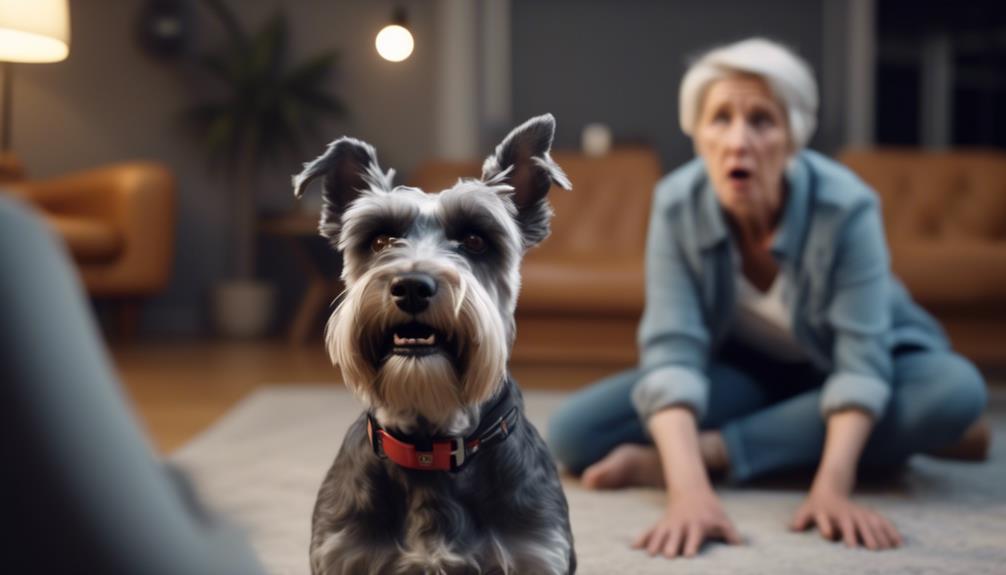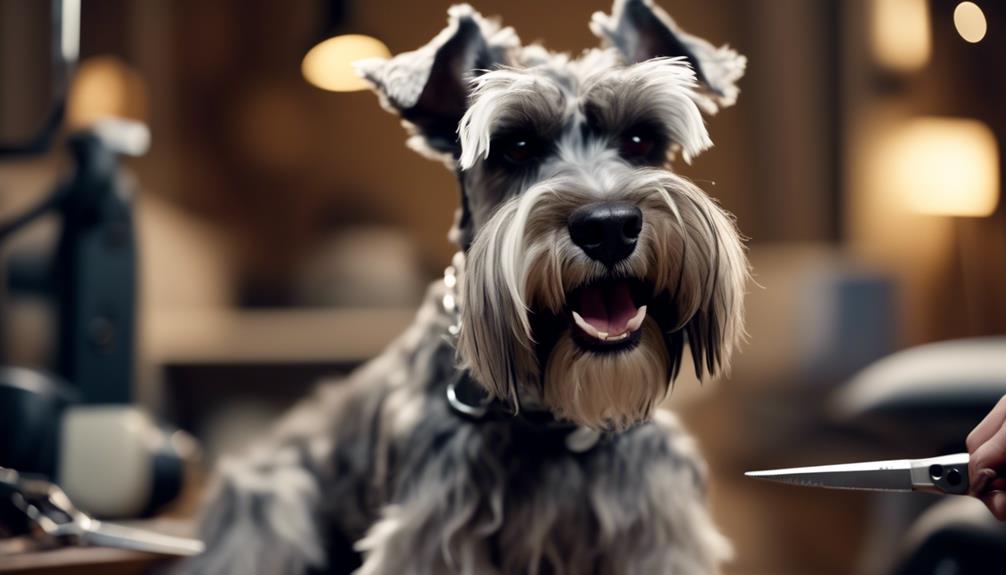Schnauzers, an often popular choice among dog lovers, have their fair share of admirers, but it is essential to shed light on their less desirable traits. While they may possess an undeniable charm, it is important to acknowledge the challenges that come with owning a Schnauzer. From their high energy levels to their stubborn nature, Schnauzers can be quite demanding. Additionally, their excessive barking, susceptibility to health issues, and difficulty in training make them less than ideal for certain households. However, there is more to explore when it comes to why Schnauzers are considered the worst dogs, and it is worth delving deeper into these considerations to gain a comprehensive understanding.
Key Takeaways
- Schnauzers have high energy levels and require daily exercise to prevent hyperactivity and behavioral problems.
- Schnauzers can be stubborn and independent, requiring a patient and consistent approach to training and handling.
- Excessive barking is a common behavior issue in Schnauzers, often caused by lack of socialization, boredom, or territorial behavior.
- Schnauzers are prone to genetic diseases and may require extensive veterinary care, resulting in high financial expenses.
High Energy Levels

Schnauzers are known for their high energy levels, which can be attributed to their inherent breed characteristics and natural disposition. These energetic dogs require regular exercise to maintain their physical and mental well-being. Failure to meet their exercise requirements can lead to hyperactivity issues and potential behavioral problems.
Exercise is essential for Schnauzers to release their pent-up energy and prevent boredom. Daily walks, runs, or engaging in activities like fetch or agility training can help them burn off excess energy. Providing them with interactive toys and puzzles can also stimulate their minds and keep them engaged.
Hyperactivity issues can arise when Schnauzers do not receive adequate exercise. Without proper outlets for their energy, they may become restless, anxious, and prone to destructive behaviors. Regular exercise helps channel their energy in a positive way, reducing the risk of hyperactivity-related issues.
Besides physical exercise, mental stimulation is equally important for Schnauzers. They are intelligent dogs and thrive on mental challenges. Engaging them in obedience training, teaching them new tricks, or participating in dog sports can help keep their minds sharp and prevent boredom-induced hyperactivity.
It is crucial for Schnauzer owners to understand their breed's exercise requirements and provide them with sufficient opportunities to expend their energy. A tired Schnauzer is a happy Schnauzer, and their high-energy levels can be managed effectively through regular exercise and mental stimulation. By meeting their needs, owners can ensure a balanced and well-behaved companion.
Stubborn and Independent
Schnauzers, known for their independent nature and stubborn tendencies, require a patient and consistent approach to training and handling. These traits can make them difficult to handle and not suitable for first-time dog owners seeking an easygoing companion.
Schnauzers are intelligent dogs that have a mind of their own. They have a strong desire to make their own decisions and may not always be willing to comply with commands. This independence can make training a challenging task, requiring patience, perseverance, and a firm but gentle hand. It is important to establish clear boundaries and consistently enforce them to earn the respect and obedience of a Schnauzer.
Their stubborn nature can also manifest in various ways, such as refusing to walk on a leash or ignoring commands. This can be frustrating for owners who are accustomed to more compliant breeds. However, it is essential to approach training sessions with a positive attitude and avoid using harsh methods or punishment, as this can further exacerbate their stubbornness.
Due to their strong-willed nature, Schnauzers require an experienced owner who can provide the necessary guidance and structure. They thrive in an environment with consistent routines and clear expectations. Novice dog owners may find it overwhelming and challenging to establish this level of consistency, resulting in a lack of control over the dog's behavior.
Excessive Barking

Excessive barking is a common behavior issue observed in many Schnauzers. While Schnauzers are known for their intelligence and loyalty, their tendency to bark excessively can be a challenge for dog owners. Understanding the underlying causes of excessive barking and employing effective training techniques can help address this issue.
Here are some possible reasons why Schnauzers may bark excessively:
- Lack of socialization: Schnauzers that have not been properly socialized may perceive certain situations or individuals as threats, leading to excessive barking as a form of protection.
- Boredom or anxiety: Schnauzers are an active breed that requires mental and physical stimulation. When they feel bored or anxious, they may resort to excessive barking as a means of releasing pent-up energy.
- Territorial behavior: Schnauzers are known to be protective of their territory. When they perceive a threat to their space or family, they may bark excessively to ward off potential intruders.
To address excessive barking in Schnauzers, it is important to employ behavioral modification techniques and consistent training. Here are some strategies that can help:
- Positive reinforcement: Rewarding your Schnauzer for calm behavior and teaching them alternative, acceptable ways to communicate can help reduce excessive barking.
- Desensitization and counterconditioning: Gradually exposing your Schnauzer to triggers that cause excessive barking and rewarding them for remaining calm can help change their response to those stimuli.
- Providing mental and physical stimulation: Engaging your Schnauzer in regular exercise, interactive toys, and mental stimulation activities can help alleviate boredom and reduce excessive barking.
Prone to Health Issues
Schnauzers, unfortunately, are prone to several genetic diseases that can significantly impact their health and wellbeing. Common genetic diseases in this breed include hip dysplasia, diabetes, and various eye conditions such as cataracts. These health issues can lead to high veterinary expenses as owners often need to seek specialized care and treatments for their Schnauzers.
Common Genetic Diseases
Genetic diseases are a significant concern for many dog breeds, including those that are prone to health issues such as Schnauzers. Responsible breeding and genetic testing are crucial in identifying and minimizing the risk of these diseases. Here are some common genetic diseases that Schnauzers may be prone to:
- Progressive Retinal Atrophy (PRA): This degenerative eye disease leads to gradual vision loss and can eventually result in blindness.
- Hyperlipidemia: Schnauzers are predisposed to high levels of fat in their blood, which can lead to pancreatitis and other health complications.
- Schnauzer Comedone Syndrome: This condition causes the formation of blackheads and can lead to skin infections.
Genetic testing allows breeders to identify carriers and avoid breeding dogs that may pass on these diseases. Responsible breeding practices, including health screening and selection of healthy breeding pairs, are essential in reducing the incidence of genetic diseases in Schnauzers and ensuring the overall well-being of the breed.
High Veterinary Expenses
Due to their susceptibility to various genetic diseases, Schnauzers often require extensive veterinary care, resulting in high financial expenses. This can place a significant financial burden on their owners, especially when unexpected medical costs arise. Schnauzers are prone to a range of health issues, including pancreatitis, urinary stones, and eye problems such as cataracts. These conditions often require specialized treatments, surgeries, and medications, all of which can quickly add up in terms of veterinary expenses. To illustrate the potential financial impact of owning a Schnauzer, consider the following table:
| Health Issue | Average Cost of Treatment |
|---|---|
| Pancreatitis | $500 – $1,000 |
| Urinary Stones | $1,000 – $3,000 |
| Cataracts | $1,500 – $3,000 |
These figures represent the average costs, and actual expenses can vary depending on the severity of the condition and the specific circumstances. Therefore, it is crucial for Schnauzer owners to be prepared for the possibility of high veterinary expenses and unexpected medical costs.
Difficult to Train

Schnauzers are often considered difficult to train due to their stubborn nature and independent behavior. Their strong-willed personalities can make obedience training a challenge, as they may resist following commands or exhibit selective listening. Additionally, their high intelligence and quick learning ability can lead to them finding creative ways to avoid doing what they are asked.
Stubborn Nature
The stubborn nature of Schnauzers can present challenges when it comes to training them effectively. These dogs are known for their resistance to training and strong-willed demeanor, which can make the training process frustrating and time-consuming. Here are a few reasons why Schnauzers can be difficult to train:
- Independent thinkers: Schnauzers have a tendency to think for themselves and make their own decisions, which can lead to a lack of compliance during training sessions.
- Strong instincts: Schnauzers have a strong prey drive and are known to chase after squirrels, birds, and other small animals. This instinctual behavior can make it challenging to redirect their attention during training.
- Boredom easily: Schnauzers are intelligent dogs and require mental stimulation to prevent boredom. Without proper mental exercise, they may become stubborn and uncooperative during training sessions.
To effectively train a Schnauzer, it is important to understand their independent nature and tailor the training methods accordingly. Patience, consistency, and positive reinforcement can go a long way in overcoming their stubbornness and achieving desired results.
Independent Behavior
Training Schnauzers can be a challenging endeavor due to their strong-willed and independent nature. These dogs are known for their intelligence and ability to think for themselves, which can make them difficult to train. Schnauzers may exhibit independent behavior by ignoring commands or choosing to do their own thing. This can be frustrating for owners who desire a dog that is obedient and responsive. Additionally, Schnauzers can be prone to separation anxiety, which further complicates their training. When left alone, these dogs may become anxious and exhibit destructive behaviors. They are also known for their territorial behavior, which can lead to aggression towards unfamiliar people or animals. To successfully train a Schnauzer, it is important to establish clear boundaries and provide consistent, positive reinforcement. Patience, understanding, and proper socialization are key to overcoming their independent nature and ensuring a well-behaved companion.
Not Ideal for Families With Small Children
Families with small children may find it challenging to accommodate the unique needs and temperament of Schnauzers. While Schnauzers can make loving and loyal companions, their characteristics may not be the best fit for households with young kids. Here are some reasons why Schnauzers may not be the ideal choice for families with small children:
- Potential aggression towards small children: Schnauzers have a tendency to be territorial and protective, which can lead to potential aggression towards unfamiliar people, including small children. This breed's instinct to defend its family can sometimes manifest as aggressive behavior, posing a risk to the safety of young children.
- Lack of patience and tolerance for young kids' behavior: Schnauzers are known for their spirited and energetic nature. They may not have the patience and tolerance required to handle the unpredictable behavior of young children. The loud noises, sudden movements, and rough play that often accompany young kids may overwhelm or irritate Schnauzers, causing them to react negatively.
- Higher energy levels and exercise needs: Schnauzers are an active breed that requires regular exercise and mental stimulation to stay happy and healthy. Keeping up with the energy levels of young children can be demanding, and without sufficient exercise, Schnauzers may become frustrated or develop behavioral issues.
While there are exceptions to every rule, these are aspects that prospective Schnauzer owners should carefully consider when thinking about bringing a Schnauzer into a household with small children. It's essential to prioritize the safety and well-being of both the children and the dog when making a decision about the suitability of a specific breed for a family.
Grooming Demands

Schnauzers require regular and meticulous grooming to maintain their distinctive appearance and overall health. Their unique coat, with its wiry texture and double layer, poses grooming challenges that can be difficult to handle for some owners.
The difficult coat maintenance of Schnauzers stems from the fact that they have a double layer of fur. This means that they have a soft undercoat and a harsh, wiry topcoat. The wiry topcoat acts as a protective layer against the elements, while the soft undercoat keeps them warm. However, this combination makes their coat prone to matting and tangling. Regular brushing is essential to prevent these tangles and keep their coat in good condition.
In addition to regular brushing, Schnauzers also require professional grooming every 6-8 weeks. This grooming session typically includes trimming their facial hair, ears, and tail, as well as clipping their coat to maintain a specific length. Their distinctive beard and mustache also require extra attention to keep them clean and free from food debris.
Neglecting the grooming needs of Schnauzers can lead to a variety of issues. Mats and tangles can become painful for the dog and may require shaving to remove them. If the coat is not properly maintained, it can become dirty and matted, which can lead to skin infections. Regular grooming sessions also provide an opportunity to check for any skin problems or abnormalities.
Frequently Asked Questions
Are All Schnauzers Prone to Excessive Barking, or Is It Just Certain Individuals?
When considering the tendency of schnauzers to bark excessively, it is important to note that this behavior can vary among individuals. While some schnauzers may have a propensity for excessive barking, it is not a universal trait for all schnauzers. Additionally, when it comes to their interactions with other pets, schnauzers can vary in their behavior. While some may get along well with other animals, others may display a tendency towards aggression. As for their potential as therapy dogs, schnauzers can indeed be successfully trained for this role, provided they receive proper training and socialization.
What Are the Specific Health Issues That Schnauzers Are Most Prone To?
When it comes to Schnauzer health issues, it is important to understand the specific conditions they are prone to. Schnauzers are known to have a higher risk of developing certain health problems such as pancreatitis, bladder stones, and skin allergies. It is crucial for Schnauzer owners to be aware of these potential issues and take necessary measures to prevent and manage them. Regular vet check-ups, proper nutrition, and early detection of any health concerns can greatly contribute to the overall well-being of Schnauzers. Additionally, training Schnauzers is essential in ensuring their obedience and good behavior.
Is It Possible to Train a Schnauzer to Be Less Stubborn and Independent?
When it comes to training a schnauzer to be less stubborn and independent, there are effective methods that can help shape their behavior. Early socialization plays a crucial role in instilling good habits and reducing stubbornness. Positive reinforcement techniques, such as rewards and praise, can encourage desired behaviors and discourage stubbornness. Consistency, patience, and firmness are key in training schnauzers, as they respond well to clear boundaries and structure. With the right approach, schnauzers can become well-behaved and obedient companions.
Are There Any Specific Grooming Techniques or Products That Can Help Manage the Grooming Demands of a Schnauzer?
When it comes to managing the grooming demands of a schnauzer, there are several effective techniques and products available. Regular brushing and combing can help prevent matting and keep their coat in good condition. Hand stripping, a technique that involves removing dead hair by hand, is often recommended for schnauzers to maintain their unique coat texture. Additionally, using specialized grooming products such as shampoos and conditioners designed for schnauzers can help manage their specific grooming needs and keep their coat looking its best.
Can Schnauzers Be Good Family Pets if They Are Properly Trained and Socialized From a Young Age?
Proper training and socialization of schnauzers from a young age are key factors in determining whether they can be good family pets. Early training and socialization help develop their behavior and temperament, enabling them to interact well with children and other pets. It is essential to expose them to various environments, people, and situations to prevent fearfulness or aggression. By providing consistent and positive reinforcement, owners can shape their schnauzer's behavior and ensure they become well-adjusted and obedient family companions.
Conclusion
In conclusion, it is evident that Schnauzers present several challenges as pets. Their high energy levels, stubbornness, excessive barking, and susceptibility to health issues make them difficult to handle. Additionally, their independent nature and resistance to training may not be suitable for inexperienced owners. Moreover, Schnauzers may not be the best choice for families with small children due to their potential for aggression. Lastly, their grooming demands require regular maintenance. As the saying goes, "Owning a Schnauzer is like having a perpetual tornado of energy and mischief in your home."

